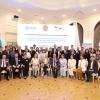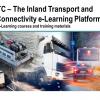News
Displaying Results 1 - 25 of 85
Responding to the request of the Governing Council of the United Nations Special Programme for the Economies of Central Asia (SPECA), UNECE is building the capacity of public and private experts in the SPECA participating States to use the semantic standards and reference data models of the UN…
Addressing ministers at the 2024 International Transport Forum Summit (ITF24) in Leipzig, UNECE Executive Secretary Tatiana Molcean recalled that 152 United Nations Member States are contracting parties to at least one of the 61 transport conventions hosted by UNECE. These legal instruments help to…
Extreme weather events exacerbated by climate change increasingly threaten the ability of countries worldwide, including those in the UNECE region, to sustain safe, reliable, and equitable transport and mobility.
Adapting to future impacts of climate change is therefore no longer a concern to be…
Addressing the Tashkent International Investment Forum (2-3 May 2024), UNECE Executive Secretary Tatiana Molcean called for the mobilization of private sector investments to support the implementation of the Sustainable Development Goals (SDGs) and to foster regional cooperation in Central Asia.…
The transport sector is responsible for 23% of global greenhouse gas emissions, with road transport accounting for around 77% of these emissions. As populations, economies, and the need for mobility grow, the World Bank estimates that greenhouse gas (GHG) emissions from transport could increase by…
On the World Day of Remembrance for Road Traffic Victims, the UN Road Safety Fund is launching the third edition of its #moments2live4 Campaign to put the spotlight on the hidden heroes of road safety.
As we ‘Remember, Act and Support’ the victims of road traffic crashes, the global Campaign calls…
Many incidents in freight transport are attributed to poor practices in the packing of freight containers, including inadequate securing of cargo, overloading and incorrect declaration of contents. The victims of these incidents may be the general public or transport and supply chain workers, who…
Bosnia and Herzegovina and Serbia are in the process of adopting road safety strategies and actions plans that rely on modern tools. In both countries, road safety audit and road safety inspection are recognized by legislation, but in-depth analysis of road crashes is still not part of the…
Countries along the middle corridor that connects Central Asia with Europe have agreed on concrete next steps to accelerate the interconnection of their national customs systems with the eTIR international system in an effort to digitalize transit in the region.
At a recent TIR Executive Board…
For many people around the world, the work and achievements of the United Nations remain in the realms of grand summits of heads of state on pressing global issues, of diplomatic brokering of peace agreements, of urgent humanitarian interventions for people in the greatest need, and other high-…
The mandatory wearing of safety-belts in cars first introduced in Europe at the turn of the 1970s has saved millions of lives around the world in the past 50 years.
According to the World Health Organization, the use of safety-belts by occupants of vehicles in front seats reduces the risk of…
On the occasion of the 7th UN Global Road Safety Week, UNECE together with UNICEF Uzbekistan and the Ministry of Interior of Uzbekistan organized a workshop to discuss how to improve the national road safety system in the country.
The workshop kicked off with a policy dialogue with national road…
Electrification of vehicles is an important tool to align the transport sector with a climate neutral future and achievement of the Sustainable Development Goals (SDGs). Focused on climate actions, this year’s annual session of UNECE’s Inland Transport Committee (ITC) agreed on dedicated actions to…
Inland transport plays a crucial role in the global economy, connecting people, goods and services to markets and opportunities. However, the rapid growth in this sector has had a significant impact on the environment. The increasing demand for faster and more efficient modes of transport has led…
Participants in the motor industry’s complex supply chains, regulators as well as investors seeking to invest sustainably are increasingly interested in considering the carbon footprint of vehicles over their entire lifetime - from material extraction and production to manufacturing, use and…
The UN Secretary-General's Special Envoy for Road Safety, Mr. Jean Todt, is in Athens on 26 and 27 September to meet several high-level officials in Greece such as the Minister for Foreign Affairs, the Minister of Citizen Protection, the Minister of Infrastructure & Transports, the Minister of…
Are you interested in learning how to promote policies to strive towards sustainable transport and better trade connectivity? Do you want to learn about the UN inland transport and trade facilitation legal instruments and standards? Do you want to increase your capacity, knowledge base and skills…
UNECE and partners train 17 Sub-Saharan African Countries on the TIR/ eTIR and CMR /eCMR Conventions
UNECE teamed up with the Islamic Center for the Development of Trade (ICDT) and the Islamic Development Bank (IsDB) to organize a training workshop on International Road and Goods Transport Conventions for executives of the Ministries of Trade and Customs Administrations of 17 member countries of…
At what point do we cease to be alarmed by a shocking reality? Many of you may already be familiar with the following figures, from the last WHO Global Status Report on Road Safety (2018).
Every year 1.3 million people are killed and around 50 million injured on the world’s roads, often with…
The temporary importation of private and commercial vehicles is managed through “carnet de passages en douane” (CPD) on the basis of two international conventions (the 1954 Customs Convention on the Temporary Importation of Private Road Vehicles; and the 1956 Customs Convention on the Temporary…
Uzbekistan faces serious challenges in the realm of road safety, with around 3,600 people killed on its roads in 2018, according to WHO figures. Between January and March 2022 alone, 39 children lost their lives on the country’s roads, where 204 out of 1,469 road accidents involved children,…
COP26 was a positive step forward in the fight against climate change, but as the UN Secretary General pointed out in his comments: “it is not enough. We must accelerate climate action to keep alive the goal of limiting the global temperature rise to 1.5 degrees.” The compromise deal reflects the…
Countries of Central Asia, the Caucasus and Eastern Europe have been hit hard by the socioeconomic impacts of the COVID-19 pandemic, which threatens to derail sustainable development progress in the region.
However, there is also a stronger momentum towards regional cooperation, and countries can…
Mobility is a primary enabler of our economic and social life. However, despite its many benefits, the costs of mobility to societies around the world remain unacceptably high. These include greenhouse gas emissions (transport accounts for some 24% of global CO2 emissions, three quarters of which…
Decarbonizing transport and mobility remains a critical policy challenge, for which we must seize the recovery from the COVID-19 pandemic as a unique opportunity to accelerate progress. Decarbonization is one example of an issue where transport, health, and environment all meet – an intersection…

























